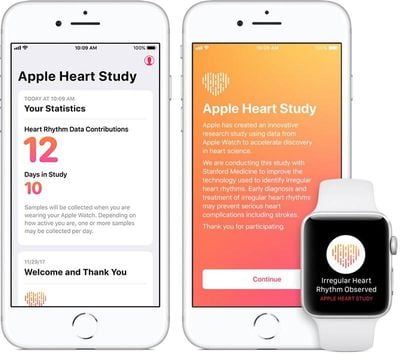Over 2,000 Participants Received Irregular Heart Rhythm Notification in Apple Watch Study
Stanford Medicine researchers presented their findings of the Apple Heart Study at the American College of Cardiology's 68th Annual Scientific Session and Expo in New Orleans today, as noted by Apple in a press release.

Apple and Stanford created the study to evaluate the Apple Watch's irregular heart rhythm notification feature, which occasionally checks the wearer's heart rhythm in the background and sends a notification if an irregular heart rhythm appears to be suggestive of atrial fibrillation.
419,093 people across the United States participated in the study. As part of the study, if an irregular heart rhythm was identified, participants received a notification on their Apple Watch and iPhone, a phone consultation with a doctor, and an ECG patch for additional monitoring.
Study results showed 0.5 percent of participants - approximately 2,095 people - received an irregular heart rhythm notification. Apple says "many participants sought medical advice following their irregular rhythm notification."
Apple COO Jeff Williams:
We are proud to work with Stanford Medicine as they conduct this important research and look forward to learning more about the impact of Apple Watch alongside the medical community. We hope consumers will continue to gain useful and actionable information about their heart health through Apple Watch.
Apple announced the Heart Study in collaboration with Stanford back in November 2017 and stopped accepting new participants in August 2018.
Popular Stories
Apple today released iOS 18.4 and iPadOS 18.4, the fourth major updates to the iOS 18 and iPadOS 18 operating system updates that came out last year. iOS 18.4 and iPadOS 18.4 come two months after Apple released iOS 18.3 and iPadOS 18.3.
Subscribe to the MacRumors YouTube channel for more videos.
The new software can be downloaded on eligible iPhones and iPads over-the-air by going to...
iOS 19 will not be available on the iPhone XR, iPhone XS, or the iPhone XS Max, according a private account on social media site X that has accurately provided information on device compatibility in the past.
The iPhone XR, iPhone XS, and iPhone XS Max all have an A12 Bionic chip, so it looks like iOS 19 will discontinue support for that chip. All other iPhones that run iOS 18 are expected...
While the iPhone 17 Pro and iPhone 17 Pro Max are not expected to launch until September, there are already plenty of rumors about the devices.
Below, we recap key changes rumored for the iPhone 17 Pro models as of March 2025:
Aluminum frame: iPhone 17 Pro models are rumored to have an aluminum frame, whereas the iPhone 15 Pro and iPhone 16 Pro models have a titanium frame, and the iPhone ...
Apple today released new firmware updates for all AirPods 4 and AirPods Pro 2 models. The new firmware is version 7E93, up from the 7B21 firmware that was installed on the AirPods Pro 2 and the 7B20 firmware available on the AirPods 4 and AirPods 4 with ANC.
It is not immediately clear what new features or changes are included in the new firmware, but we'll update this article should we find ...
Apple's big developer event is a little over two months away, and rumors about what we can expect to see in Apple's next major operating system updates are becoming increasingly frequent.
A public release of iOS 18.4 is also imminent with a number of updates and improvements, although we won't be getting the major Apple Intelligence Siri upgrades that had reportedly been planned for this...
Apple today released macOS Sequoia 15.4, the fourth major update to the macOS Sequoia operating system that launched in September. macOS Sequoia 15.4 comes two months after the launch of macOS Sequoia 15.3.
Mac users can download the macOS Sequoia update through the Software Update section of System Settings. It is available for free on all Macs able to run macOS 15.
With...
Multiple sources have claimed that iOS 19 will introduce a new design with more translucent buttons, menus, notification banners, and more, and there is now another clue that points towards this glass-like appearance.
Bloomberg's Mark Gurman today said the new design project is codenamed "Solarium" internally. A solarium is a room with glass walls that allow in plenty of sunlight, so this...
Apple today released watchOS 11.4, the fourth major update to the operating system that runs on the Apple Watch. watchOS 11.4 is compatible with the Apple Watch Series 6 and later, all Apple Watch Ultra models, and the Apple Watch SE 2.
watchOS 11.4 can be downloaded on a connected iPhone by opening up the Apple Watch app and going to General > Software Update. To install the new software,...






















